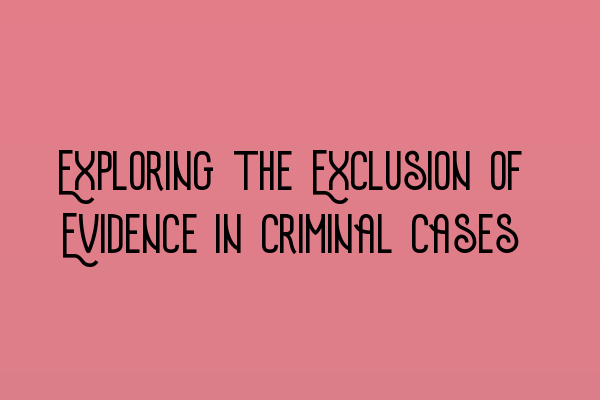Exploring the Exclusion of Evidence in Criminal Cases
When it comes to criminal cases, obtaining and presenting evidence is crucial in proving guilt or innocence. However, not all evidence is admissible in court. The exclusion of evidence is a complex and important aspect of criminal law, as it can greatly impact the outcome of a case.
In this article, we will delve into the concept of excluding evidence in criminal cases, exploring its significance, the legal principles behind it, and how it can affect the trial process.
The Importance of Excluding Evidence
Excluding evidence serves as a safeguard to ensure fairness and justice in criminal proceedings. The purpose is to prevent the use of evidence that is obtained unlawfully, unethically, or violates the accused’s rights. This exclusionary rule helps maintain the integrity of the legal system and protect individuals from unjust convictions.
Excluding evidence can have a significant impact on the outcome of a case. If crucial evidence is deemed inadmissible, it could weaken the prosecution’s case or even lead to its collapse. On the other hand, the exclusion of evidence can also benefit the defense, as it may remove key elements of the prosecution’s argument.
Legal Principles Governing the Exclusion of Evidence
The exclusion of evidence is primarily governed by the rules of evidence, which vary between jurisdictions. In the United Kingdom, the admissibility of evidence is primarily determined by the Police and Criminal Evidence Act 1984 (PACE) and the common law.
Under PACE, evidence may be excluded if it has been obtained through improper conduct by the police, such as coercion, oppression, or a breach of the suspect’s rights. The courts also consider the fairness and reliability of the evidence when determining its admissibility.
The common law incorporates principles such as the “fruit of the poisonous tree” doctrine, which states that evidence derived from an initially unlawful act should be excluded. Additionally, the courts consider the public interest in admitting or excluding evidence, taking into account the impact on the administration of justice.
Common Grounds for Excluding Evidence
There are several common grounds on which evidence may be excluded in criminal cases:
- Illegally Obtained Evidence: Evidence obtained through illegal searches, seizures, or detentions may be excluded. This includes evidence obtained without proper authorization or in violation of the suspect’s rights.
- Unreliable Evidence: Evidence that is deemed unreliable or lacking in credibility may also be excluded. This could include hearsay evidence, which is generally inadmissible unless it falls within an exception.
- Improper Disclosure: Failure to disclose evidence to the defense in a timely and proper manner can lead to its exclusion. The prosecution has a duty to provide all relevant material to the defense.
- Breaches of Legal Procedures: Evidence may be excluded if it was obtained through a breach of legal procedures, such as tampering with evidence or failing to follow proper protocols.
The Impact on the Trial Process
The exclusion of evidence can significantly impact the trial process and the strategies employed by the prosecution and defense. For the prosecution, the exclusion of key evidence can weaken their case, making it more challenging to meet the burden of proof beyond a reasonable doubt.
The defense, on the other hand, may strategically seek to exclude evidence that could be damaging to their client’s case. This could involve challenging the admissibility of evidence on various grounds, such as improper collection, unreliable witnesses, or violation of legal procedures.
Excluding evidence also affects the dynamics of plea bargaining and negotiations between the parties involved. If a significant piece of evidence is excluded, it may prompt the prosecution to reassess the strength of their case and potentially offer a more favorable plea deal to the accused.
Conclusion
The exclusion of evidence in criminal cases is a fundamental aspect of the legal system, ensuring that justice is served and protecting individuals’ rights. Understanding the grounds for excluding evidence and the impact it can have on proceedings is crucial for both legal professionals and individuals involved in criminal cases.
For more information and expert advice on various legal matters, be sure to visit our related articles:
- Legal Representation for Delaware LLCs in the UK: Expert Advice
- Ensuring Ethical Business Practices: Delaware’s Code of Conduct
- Legal Challenges for UK Businesses in the U.S.: Strategies for Overcoming Hurdles
- UK Criminal Law: An In-Depth Analysis of the British Legal System
- Legal Challenges for UK Businesses in the U.S.: Strategies for Overcoming Hurdles
